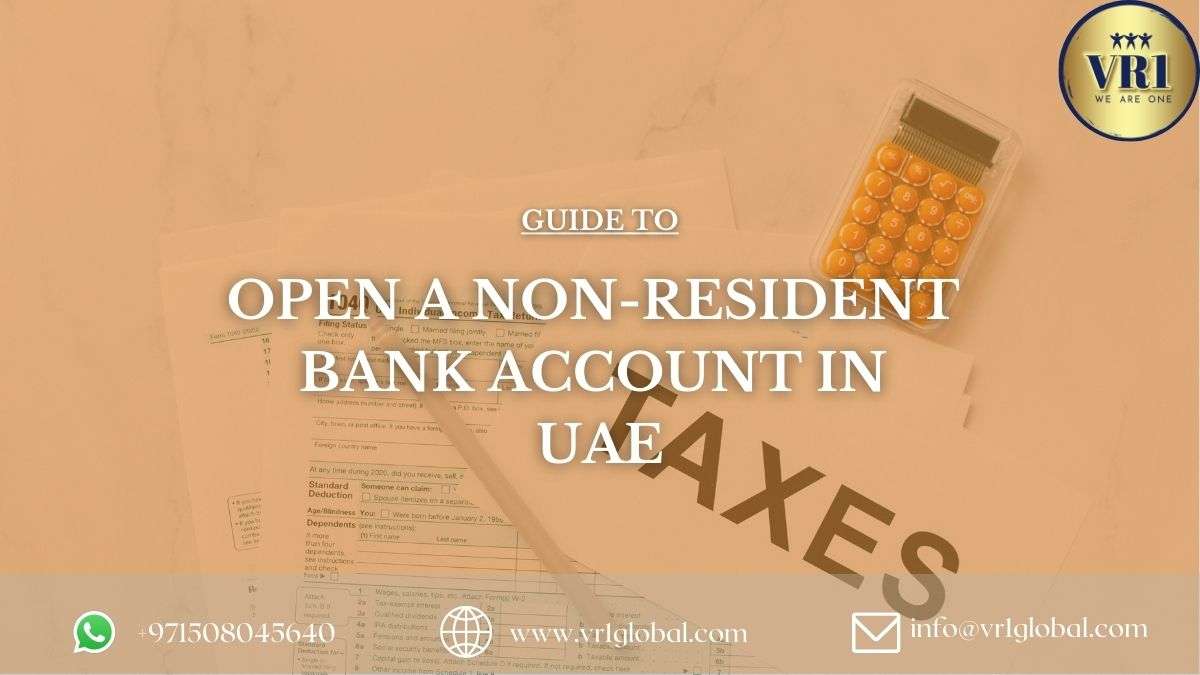Guide to Opening a Non-Resident Bank Account in UAE
Are you a non-resident who wants to open a bank account in Dubai? Whether you’re an ex-pat, a student, or a business owner, opening a non-resident bank account in UAE (or Dubai) can be challenging.
However, with the proper insider knowledge and contacts, you can hassle-free open a bank account in Dubai, UAE.
In this article, we will guide you through the process of opening a non-resident bank account in Dubai, UAE.
What is a Non-Resident Bank Account in UAE?
A non-resident bank account in UAE is a type of bank account that people who are not UAE residents can open. This account is intended for adults who want to do business or manage their funds in the UAE but do not have a residency visa or live in the country.
Non-resident bank accounts may be created with most UAE banks and provide identical services and benefits to normal bank accounts.
Online banking, ATM access, international money transfers, and account management via mobile applications are examples of these services.
You normally need to present proof of identification and proof of address in your home country to create a non-resident bank account in the UAE.
Further documents, such as a letter of reference from a present bank or financial institution, may be required by some institutions. Don’t worry if that sounds too much, we will go through each in detail now. But before that, let me explain why you need to open a Bank account in UAE.
Benefits of Opening a Bank Account in UAE
As the UAE has grown to become a global financial hub, more and more people are considering opening a non-resident bank account in the country.
Whether you are an expatriate, a frequent traveler, or an international investor, there are several advantages to having a non-resident bank account in UAE.
1. Convenience
One of the primary benefits of opening a non-resident bank account in the UAE is the increased convenience that it offers.
With a non-resident bank account, you can easily access your funds while you are in the UAE without having to carry large amounts of cash.
You can also make purchases using your account and avoid the foreign transaction fees that are typically associated with using a credit card from your home country.
Additionally, many banks offer online banking services that allow you to manage your account from anywhere in the world, making it even more convenient.
2. Improved Security
Carrying large amounts of cash while traveling can be risky, especially in a foreign country where you may not be familiar with the local customs and laws.
By opening a non-resident bank account in the UAE, you can reduce the risk of theft or loss by storing your funds in a secure account.
Most banks in the UAE offer high levels of security for their accounts, including biometric authentication and two-factor authentication to prevent unauthorized access.
3. Potential Tax Advantages
Another benefit of opening a non-resident bank account in the UAE is the potential tax advantages that it can offer.
The UAE has a favorable tax regime, with no personal income tax, no corporate tax, and no value-added tax (VAT) on certain goods and services.
By opening a non-resident bank account in the UAE, you may be able to take advantage of these tax benefits and potentially save money on your taxes.
4. Easy Account Opening Process
Opening a non-resident bank account in the UAE is a relatively simple process. Most banks offer online account opening services that allow you to open an account from anywhere in the world.
All you need is your passport and proof of your non-resident status, such as a visa or residency permit from your home country.
Additionally, many banks offer multilingual customer service, making it easy to get assistance with any questions or issues that you may encounter.
5. Competitive Interest Rates
Many banks in the UAE offer competitive interest rates on non-resident bank accounts, making them an attractive option for individuals who want to earn a higher return on their deposits.
Some banks also offer fixed deposit accounts with even higher interest rates, providing a safe and secure way to grow your savings.
6. Access to Additional Services
Opening a non-resident bank account in the UAE can also give you access to a range of additional banking services.
Many banks offer credit cards, loans, and investment products that are only available to their account holders.
By opening a non-resident bank account, you may be able to take advantage of these additional services and improve your financial situation.
7. Diverse Currency Options
The UAE is known for its strong currency, the UAE dirham (AED). By opening a non-resident bank account, you can take advantage of the diverse currency options available to you.
Many banks in the UAE offer accounts in multiple currencies, including USD, GBP, and EUR, making it easy to manage your funds in your preferred currency.
8. No Minimum Balance Requirements for Few Banks
Another benefit of opening a non-resident bank account in the UAE is that there are typically no minimum balance requirements.
This means that you can open an account with a small deposit and not have to worry about maintaining a minimum balance.
Likewise, some banks offer no-fee accounts, making it even more affordable to manage your finances.
9. Enhanced Reputation and Credibility
Having a non-resident bank account in the UAE can also enhance your reputation and credibility, particularly if you are conducting business in the region.
A local bank account shows that you are committed to doing business in the UAE and that you have a legitimate presence in the country.
This can help build trust with clients and partners and improve your overall business reputation.
10. Access to International Banking Services
The UAE is a major international financial hub, and as such, many banks offer a range of international banking services.
By opening a non-resident bank account in the UAE, you can take advantage of these services, including global money transfers, foreign currency exchange, and offshore investments.
This can be particularly beneficial for individuals who have international financial interests.
6 Types of Non-Resident Bank Accounts in UAE
The UAE banking sector is known for its strict regulations and advanced technology, which make banking safe, secure, and convenient.
Every Bank in UAE offers multiple features & offers for Non- residents who plan to open their accounts. Now we will take a look at the type of Bank account that the bank offers.
1. Non-Resident External (NRE) Account
A Non-Resident External (NRE) account is a type of bank account that is maintained in Indian Rupees (INR) and is designed for non-resident Indians (NRIs).
This account can be opened by NRIs who have income earned outside of India and wish to transfer their foreign income into India without converting it to INR.
2. Non-Resident Ordinary (NRO) Account
A Non-Resident Ordinary (NRO) account is a type of bank account that is maintained in Indian Rupees (INR) and is designed for non-resident Indians (NRIs) who have income earned in India, such as rent, dividends, or pension.
This account can be used to deposit and manage income earned in India and can be opened by NRIs and persons of Indian origin (PIOs).
3. Foreign Currency Non-Resident (FCNR) Account
A Foreign Currency Non-Resident (FCNR) account is a type of bank account that is maintained in foreign currency and is designed for non-residents who want to deposit their foreign income in a fixed deposit account. This account can be opened in major currencies such as USD, GBP, EUR, and JPY, among others.
4. Resident Foreign Currency (RFC) Account
A Resident Foreign Currency (RFC) account is a type of bank account that is maintained in foreign currency and is designed for residents of India who have foreign income.
This account can be used to deposit and manage foreign income earned outside of India and can be opened by individuals who have returned to India after being a non-resident for a continuous period of not less than one year.
5. Offshore Banking
Offshore banking refers to banking services that are provided outside of the country of residence of the account holder.
This can include services such as online banking, international wire transfers, and foreign currency accounts.
Many offshore banking services are available to non-residents in the UAE, making it an attractive destination for international investors and businesses.
6. Corporate Bank Account
A corporate bank account is a type of bank account that is designed for businesses and corporations.
Non-resident companies can also open corporate bank accounts in the UAE. This account can be used to manage business finances, receive payments & manage all the transactions for your Business.
Step By Step Process to Open a Non-Resident Bank Account in UAE
Step 01: Determine the Right Bank and Account Type for You
Before opening a non-resident bank account in the UAE, it is essential to determine the right bank and account type that suits your needs.
Each bank has different policies and fees, so it is crucial to do thorough research before choosing one. Some of the factors you should consider include:
- The bank’s reputation
- The account opening fees and minimum balance requirements
- The bank’s interest rates and fees for transactions
- The bank’s customer service
Since you are new to UAE you need to be very careful about your source of information.
Opening a Bank account in any bank is different from Opening a bank account from the right bank, which values your business, adheres to rules & provides transparent & timely responses on your accounts.
I know this is a very tedious task. But we are here to help you!
We at VR1 Global Business Setup Consultancy, have worked with multiple banks and know their requirements & which suits best of your type of business. You can always reach out to us & specify your requirements to open a bank account and we will get it done within no time by making you feel at peace.
Step 02: Gather Required Documents
To open a non-resident bank account in the UAE, you will need to provide several documents. These include:
- A valid passport
- A residency visa (if applicable)
- Proof of address (such as a utility bill or tenancy contract)
- Bank statements from your current bank
- It is important to note that each bank may require additional documents, so it is best to check with your chosen bank for a comprehensive list.
Step 03: Submit the Application
Once you have gathered all the required documents, you can submit your application to your chosen bank. The application process can usually be completed online or in person, depending on the bank’s policies. If you are submitting your application online, you will need to scan and upload all the required documents.
At VR1 Global Business setup Consultancy, our company formation experts will guide you throughout this process from the documentation & signatory part.
Step 04: Wait for Approval
After submitting your application, the bank will review it and inform you of its decision. If your application is approved, you will receive an email or a phone call from the bank.
The bank may require you to provide additional information or documents before finalizing the account opening process.
Step 05: Fund Your Account
Once your account is approved, you will need to fund it to start using it.
You can transfer funds from your current bank to your new non-resident bank account in the UAE. Alternatively, you can visit the bank and deposit cash or a cheque.
Documents Required to Open a Non-Resident Bank Account in Dubai
To open a non-resident bank account in the UAE, you will need to provide certain documents to the bank. These typically include:
- A valid passport copy
- Proof of residency in your home country
- Proof of income or source of funds for your Business or Profession
- A reference letter from your current bank
- A completed application form
- Your CV, which covers all details of your professional experience
Depending on the type of account you are opening, additional documents may be required.
Bank Account Charges in UAE for Non-Residents
- Initial Deposit Charges for a Non-Resident Bank Account (varied from bank to bank)
- Account Maintenance Fees (varied from bank to bank)
- Interest Rates (varied from bank to bank)
- Transaction Charges (varied from bank to bank)
- Exchange Rate Conversion Charges
- Lost or replacement debit cards charges (varied from bank to bank)
- Early account closure (varied from bank to bank)
- Account statements (varied from bank to bank)
How to Manage a Bank Account in UAE?
Managing these Non-Resident Bank accounts can be challenging, especially if you are not familiar with the local banking practices and regulations. So to save you from the struggle, find these best practices to manage your account:
1. Providing Accurate Information
When opening a non-resident bank account in UAE, you will be required to provide accurate information about yourself or your company. This includes your name, address, contact details, and other relevant information. It’s crucial to ensure that this information is correct to avoid any issues with the account in the future.
2. Keeping Records
It’s important to keep detailed records of all transactions made from your non-resident bank account in the UAE. This includes deposits, withdrawals, and transfers. Having accurate records will help you track your finances and comply with any tax requirements in your home country.
3. Monitoring Account Activity
Regularly monitoring your non-resident bank account activity is another best practice for maintaining the account’s security. This includes reviewing transactions, checking for any unusual activity, and reporting any suspicious transactions to the bank.
4. Understanding Regulations
UAE has specific regulations governing non-resident bank accounts, and it’s important to be aware of these regulations to avoid any legal issues. For example, non-resident accounts are subject to certain limits on the amount of funds that can be transferred and the frequency of transfers.
5. Keeping Your Account Active
Non-resident bank accounts in UAE require periodic maintenance to keep them active. This includes making regular deposits, ensuring that the account remains in good standing, and updating your contact information if it changes.
6. Using Secure Online Banking
Most banks in UAE offer online banking services, which provide a convenient way to manage your non-resident account. However, it’s essential to ensure that you use secure online banking practices, such as using strong passwords, logging out after each session, and avoiding public Wi-Fi when accessing your account.
7. Seeking Professional Assistance
If you’re unfamiliar with the banking practices and regulations in UAE, it may be helpful to seek professional assistance. This includes consulting with a local attorney or accountant who can provide guidance on managing your non-resident account and complying with local laws.
What are the best Banks for Non-Residents in UAE?
Here are some of the best banks for non-residents in the UAE, based on our experience:
1. Emirates NBD
2. Mashreq Bank
3. Abu Dhabi Commercial Bank (ADCB)
4. Dubai Islamic Bank
5. Standard Chartered Bank
6. National Bank of Abu Dhabi
7. HSBC Bank Middle East Limited
8. Commercial Bank of Dubai
9. RAKBANK
10. Abu Dhabi Islamic Bank
How to Close a Non-Resident Bank account in UAE?
1. Notify the bank:
The first step is to inform your bank that you want to close your account. You can do this by visiting the bank in person, calling the customer service center, or sending an email. The bank may ask for some information to confirm your identity and account details.
2. Settle any outstanding dues:
Before closing your account, you need to settle any outstanding dues, such as credit card payments, loan installments, or overdraft balances. You can request a final statement from the bank to confirm the amount due.
3. Return any unused cheques or cards:
If you have any unused cheques or debit/credit cards, you need to return them to the bank. The bank may also ask you to sign a form to confirm that you have returned all the bank’s property.
4. Close the account:
Once you have settled all the dues and returned any unused items, the bank will process your account closure request. The bank may ask you to fill out a form, sign some documents, or provide some additional information. The account closure process may take a few days to a week, depending on the bank’s policies.
5. Collect a confirmation:
After the account closure process is completed, you should collect a confirmation letter from the bank stating that your account has been closed. You can keep this letter for future reference and to ensure that no further transactions take place on the closed account.
FAQs on Opening a Non-Resident Bank Account in UAE
Q. Who is eligible to open a non-resident bank account in the UAE?
Non-residents who have a valid passport and proof of their non-resident status, such as a visa or residency permit, are typically eligible to open a non-resident bank account in the UAE.
Q. Are there any fees associated with opening a non-resident bank account in the UAE?
Some banks may charge fees for opening a non-resident bank account, but many offer no-fee accounts. It is important to check with individual banks to understand their fee structures.
Q. Can non-resident bank accounts in the UAE be used for business purposes?
Yes, many non-resident bank accounts in the UAE can be used for business purposes, including receiving payments and making transactions.
Q. What currency options are available for non-resident bank accounts in the UAE?
Many banks offer non-resident bank accounts in multiple currencies, including USD, GBP, and EUR.
Q. What services do UAE banks offer to non-residents?
UAE banks offer various services to non-residents, such as online banking, credit cards, foreign exchange, investment options, and more.
Conclusion
Choosing the best bank for non-residents in UAE can be a daunting task, but by considering the essential factors, such as bank fees, availability of services, minimum deposit requirement, branch and ATM network, and customer support, you can narrow down your options.
I hope this article, this article gave you a clear view & idea of how to open your Non-Resident Bank account in UAE. If you still have any more questions, you can feel free to contact us!
VR1 Global Business setup consultancy is one of the best company formation experts in Dubai, and if you are planning to start your own business here or open a Non-Resident Bank Account in UAE, you can contact our company formation experts who are adept at dealing with all of your queries and concerns without you worrying about the supporting documentation and procedure. Call or WhatsApp +971508045640 today for a free consultation call with our business setup experts.






